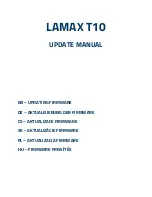
OFF (Flash Override)
When you don't want the flash to fire even in
the dark or when you want to shoot such
subjects as fireworks.
In the Flash-Off mode, the flash does not fire even in
low-light conditions. Use this mode in situations where
flash photography is not desired or is prohibited or in
twilight or night scenes.
Note: Since a slow shutter speed (down to 4 seconds) is
automatically selected in low-light situations when in the
Flash-Off mode, the use of a tripod is recommended to
prevent blurred pictures caused by shaking the camera.
Closing the lens barrier returns to Auto.
33
















































